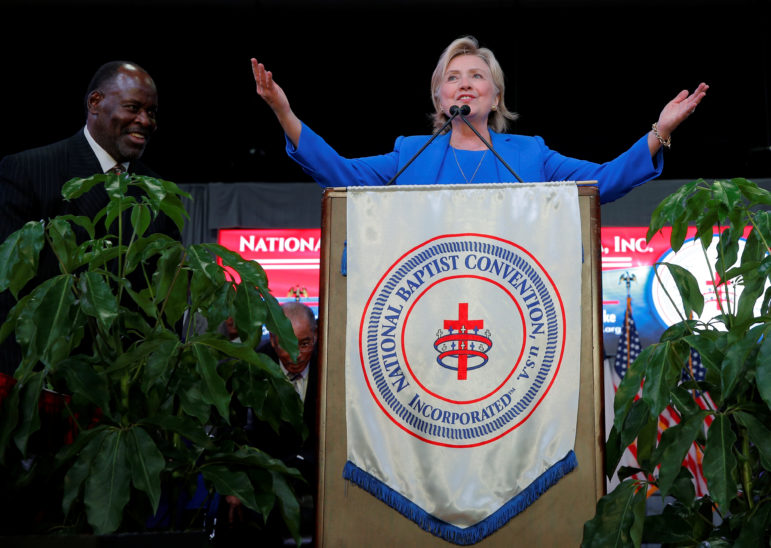Yesterday, Donald Trump addressed a church in Flint, Michigan. The event took an awkward turn when the pastor interrupted him, reminding him that he wasn’t invited to give a campaign speech. Whatever the pastor’s motivation, her reminder protected the church from violating federal law: Trump may speak in her church, but he can’t campaign there.
According to the IRS guidelines, the legality of a candidate’s presence in a church depends on context. Here are five basic rules that apply to churches and other religious communities during an election.
1. Religious groups that aren’t 501(c)(3) organizations may do whatever they want.
Federal law bans not-for-profit groups from supporting candidates. Nearly all churches are 501(c)(3) organizations, but some religious groups may be too small to be an official charitable group. A Bible study led by unpaid volunteers, for example, is unlikely to be incorporated. Such groups are free to do whatever they want because the tax code doesn’t apply to them.
2. The law only applies to organizations, not the individuals in that organization.
Let’s say a member of the church calls up other members of her church to ask if they’ll work with her to support a candidate. She does so as an individual and does not represent the church. A few dozen members hold a rally at public park that features the candidate and doesn’t have any signs or other remarks mentioning the name of the church. This is all perfectly legal.
3. The law applies during any event held by the congregation.
If someone could presume that the church organized the event, then it’s the church’s responsibility to keep it clear of electioneering. This obviously includes worship services, but it also would include committee meetings, church-organized Bible studies held at homes, and church-sponsored community service projects. Events held at church-operated schools, soup kitchens, and homeless shelters also count.
4. Churches may host candidates to speak about the election, but they must do so in a way that is not partisan and gives equal opportunity to all the candidates.
A church may invite each of the candidates to speak during the worship service and field questions from the congregation. So long as the church doesn’t endorse one of the candidates or show bias against the candidates, this is all legal. The church is giving a non-partisan forum for all candidates to discuss the election. Even if a candidate declines to attend, the church is acting legally because it invited each of the candidates.
5. A church may invite just one candidate, so long as it’s not an election-related event—the church and the candidate can’t explicitly mention the election.
Candidates are often prominent members of the community who speak about religion, values, justice, social problems, and other topics that are not directly related to a campaign.
Churches get into trouble, however, if there is a reference call is made to support the candidate in the election.
For example, if a candidate is speaking and asks the congregation to vote for her on election day, then the sermon has become a stump speech. The church has now given preferential treatment to one candidate and thus supported her campaign. The same problem would occur if the pastor told the congregation that the candidate needed everyone’s support in the election.
There are a lot of remarks that could be made by a pastor or candidate that seem like endorsements, but they aren’t. A church leader may praise a candidate as long as the magic words, “vote for this candidate,” are avoided.
A religious leader may acknowledge that a public official or candidate is in attendance. A pastor may say, “I’m happy to see the Congressman here with us. He is a man of God who is doing God’s work. Our country is better off because of him.” This is fine. The pastor may even have the Congressman come up and pray or say a few words to the audience.
But what if the same pastor would cross the proverbial line by adding, “our Congressman is facing a difficult election, and we all need to support him.” At that point, the church may have violated the law. Even then, the pastor could be referring to support such as praying for the candidate.
The magic word is “vote.” Saying, “we need everyone to vote for the candidate” or “don’t vote for the other candidate” are clear no-nos. The church is also in trouble if the candidate mentions his election while speaking to the congregation.
Bottom line: Anyone may speak at to a church. But if the person’s candidacy or the election is discussed, then the church must remain non-partisan and fair to all of the other candidates in the race.
Note: A version of this article originally appeared in 2014.
Don’t miss any more posts from the Corner of Church & State. Click the red subscribe button in the right-hand column. Follow @TobinGrant on Twitter and on the Corner of Church & State Facebook page.





